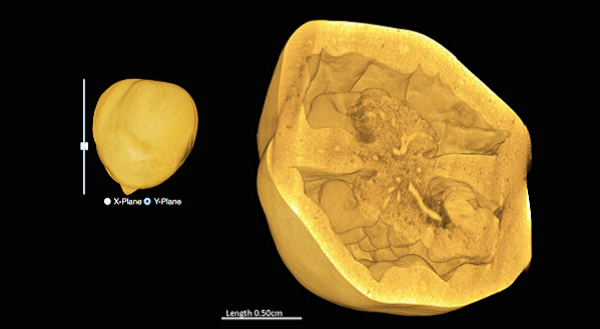
CT image of the internal structure of a developing tomato fruit, Rose Lab
The Need
Jocelyn Rose’s lab studies the structure, function and metabolism of plant cell walls and their roles in growth, development and environmental interactions. Like most labs, they manage a lot of data, but some of the newer projects they are working on, like characterizing the plant cell wall proteome, generate numerous medium to large data files.
The Challenge
The lab manager was contacted by their college’s IT department and told that they were approaching the storage limit on the department’s shared file servers. More space is available for a fee, but the lab manager wants to make sure that they are using best practices and would like help figuring out the storage options available to them.
The Solution
The lab manager worked with RDMSG consultants to determine the best solutions for storing, accessing, and archiving the data generated in the lab. Upon inspection, we realized that the majority of the data that was causing them to approach the storage limit was older, infrequently accessed data, some of which were medium to large file sizes, but nothing larger than 5GB (Box’s limit is 15GB).
Because the older files were infrequently used, not confidential, and they could accept some risk tolerance related to availability and durability, the lab decided to move them over to Cornell University Box, which provides unlimited online storage for Cornell researchers thanks to a campus-wide license at no direct cost. Easy collaboration is also a priority, so actively used data and administrative files will also be shared via Box, which can be accessed by both Cornell and non-Cornell researchers from any device, anywhere. The lab manager and delegates have fine grained control over the types of access different collaborators receive.
In order to minimize the amount of data stored on the lab’s computers, inactive data will only be on Box, while actively used data and administrative files will also be synced on the lab computers via Box Sync. The lab continues to use the shared file server provided through the college, which are backed up using EZ-Backup, a fee-based automated remote backup service, ensuring that their non-archival data is safely backed up at all times.